- Home
- Truman Capote
Portraits and Observations Page 6
Portraits and Observations Read online
Page 6
But at that moment the door slid open and two of the officials entered. They did not look at the old ladies but went straight to the birdcage and stripped away its covering shawl. “Basta, basta,” screamed the parrot.
With a lurch the train came to a halt in the mountain darkness. The abruptness of this toppled the cage, and the parrot, suddenly free, flew laughingly from wall to wall of the compartment while the ladies, flurried and flying themselves, grasped for it. The customs men went on taking the cage apart; in the feed tray were a hundred or so papers of heroin wrapped like headache powders, and in the brass ball atop the cage there were still more. The discovery did not seem to irritate the ladies at all; it was the loss of their parrot that upset them. For all at once it had flown out the lowered window, and the desperate ladies stood calling after it, “Tokyo, you will freeze, little Tokyo, come back! Come back!”
He was laughing somewhere in the dark. There was a cold northern moon, and for an instant we saw him flying flat and dark against its brilliance. They turned then and faced the door; it was crowded now with onlookers. Poised, disdainful, the ladies stepped forward to meet faces they seemed not to see, and voices they certainly never heard.
ISCHIA
(1949)
I forget why we came here: Ischia. It was being very much talked about, though few people seemed actually to have seen it—except, perhaps, as a jagged blue shadow glimpsed across the water from the heights of its celebrated neighbor, Capri. Some people advised against Ischia and, as I remember, they gave rather spooky reasons: You realize that there is an active volcano? And do you know about the plane? A plane, flying a regular flight between Cairo and Rome, crashed on top an Ischian mountain; there were three survivors, but no one ever saw them alive, for they were stoned to death by goatherds intent on looting the wreckage.
Consequently, we watched the chalky façade of Naples fade with mixed anticipation. It was a classic day, a little cold for southern Italy in March, but crisp and lofty as a kite, and the Princepessa spanked across the bay like a sassy dolphin. It is a small civilized boat with a tiny bar and a somewhat outré clientele: convicts on their way to the prison island of Procida or, at the opposite extreme, young men about to enter the monastery on Ischia. Of course, there are less dramatic passengers: islanders who have been shopping in Naples; here and there a foreigner—extraordinarily few, however: Capri is the tourist catch-all.
Islands are like ships at permanent anchor. To set foot on one is like starting up a gangplank: one is seized by the same feeling of charmed suspension—it seems nothing unkind or vulgar can happen to you; and as the Princepessa eased into the covelike harbor of Porto d’Ischia it seemed, seeing the pale, peeling ice-cream colors of the waterfront, as intimate and satisfying as one’s own heartbeat. In the wrangle of disembarking, I dropped and broke my watch—an outrageous bit of symbolism, too pointed: at a glance it was plain that Ischia was no place for the rush of hours, islands never are.
I suppose you might say that Porto is the capital of Ischia; at any rate, it is the largest town and even rather fashionable. Most people who visit the island seldom stray from there, for there are several superior hotels, excellent beaches and, perched in the offing like a giant hawk, the Renaissance castle of Vittoria Colonna. The three other fair-sized towns are more rugged. These are: Lacco Ameno, Cassamiciola and, at the farthest end of the island, Forio. It was in Forio that we planned to settle.
We drove there through a green twilight and under a sky of early stars. The road passed high above the sea, where fishing boats, lighted with torches, crawled below like brilliant water-spiders. Furry little bats skimmed in the dusk; buena séra, buena séra, dim evening voices called along the way, and herds of goats, jogging up the hills, bleated like rusty flutes; the carriage spun through a village square—there was no electricity, and in the cafés the tricky light of candles and kerosene lamps smoked the faces of masculine company. Two children chased after us into the darkness beyond the village. They clung panting to the carriage as we began a steep careening climb, and our horse, nearing the crest, breathed back on the chilled air a stream of mist. The driver flicked his whip, the horse swayed, the children pointed: look. It was there, Forio, distant, moon-white, the sea simmering at its edges, a faint sound of vesper bells rising off it like a whirl of birds. Multo bella? said the driver. Multo bella? said the children.
When one rereads a journal it is usually the less ambitious jottings, the haphazard, accidental notations that, seen again, plow a furrow through your memory. For example: “Today Gioconda left in the room assorted slips of colored paper. Are they presents? Because I gave her the bottle of cologne? They will make delightful bookmarks.” This reverberates. First, Gioconda. She is a beautiful girl, though her beauty depends upon her mood: when she is feeling glum, and this seems too often the case, she looks like a bowl of cold oatmeal; you are likely to forget the richness of her hair and the mildness of her Mediterranean eyes. Heaven knows, she is overworked: here at the pensione, where she is both chambermaid and waitress, she gets up before dawn and is kept on the run sometimes until midnight. To be truthful, she is lucky to have the job, for employment is the island’s major problem; most girls here would like nothing better than to supplant her. Considering that there is no running water (with all that that implies), Gioconda makes us remarkably comfortable. It is the pleasantest pensione in Forio, an interesting bargain, too: we have two huge rooms with great expanses of tiled floor and tall shutter-doors which lead onto little iron balconies overlooking the sea; the food is good, and there is rather too much of it—five courses with wine at lunch and dinner. All included, this costs each of us about one hundred dollars a month. Gioconda speaks no English, and my Italian is—well, never mind. Nevertheless, we are confidantes. With pantomime and extravagant use of a bilingual dictionary we manage to convey an astonishing lot—which is why the cakes are always a flop: on gloomy days when there is nothing else to do we sit in the patio-kitchen experimenting with recipes for American pastries (“Toll House, what is?”), but these are never a success because we are too busy thumbing through the dictionary to give our baking much attention. Gioconda: “Last year, in the room where you are, there was a man from Rome. Is Rome like he said, so wonderful? He said I should come and visit him in Rome, and that it would be all right because he was a veteran of three wars. First World War, Second, and Ethiopia. You can see how old he was. No, I have never seen Rome. I have friends who have been there, and who have sent me postcards. You know the woman who works at the posta? Of course you believe in the evil eye? She has one. It is known, yes. That is why my letter never comes from Argentina.”
Not receiving this Argentine letter is the real cause of Gioconda’s misery. A faithless lover? I have no idea; she refuses to discuss it. So many young Italians have migrated to South America looking for work; there are wives here who have waited five years for their husbands to send them passage. Each day, when I come bringing the mail, Gioconda rushes to meet me.
Collecting the mail is a self-appointed chore. It is the first time during the day that I see the other Americans living here: there are four at the moment and we meet at Maria’s café in the piazza (from the journal: “We all know that Maria waters her drinks. But does she water them with water? God, I feel awful!”). With the sun warming you, and Maria’s bamboo curtains tinkling in the breeze, there is no nicer place to wait for the postman. Maria is a sawed-off woman with a gypsy face and a shrugging, cynical nature; if there is anything you want around here, from a house to a package of American cigarettes, she can arrange it; some people claim she is the richest person in Forio. There are never any women in her café; I doubt that she would allow it. As noon heightens, the village converges in the piazza: like blackbirds schoolchildren in capes and wooden sandals flock and sing in the alleys, and squadrons of unemployed men lounge under the trees laughing roughly—women passing them lower their eyes. When the mailman comes he gives me the letters for our pensione; then I must g
o down the hill to face Gioconda. Sometimes she looks at me as though it were my fault that the letter never comes, as though the evil eye were mine. One day she warned me not to come home empty-handed; and so I brought her a bottle of cologne.
But the slips of gaudy paper that I found in my room were not, as I had supposed, a present in return. It was intended that we should shower these upon a statue of the Virgin which, newly arrived on the island, was being toured through most of the villages. The day the Virgin was to visit here every balcony was draped with fine laces, finer linens—an old bedspread if the family had nothing better; woven flowers garlanded the cramped streets, old ladies brought out their longest shawls, men combed their mustaches, someone put the town idiot into a clean shirt, and the children, dressed all in white, had angel-wings of golden cardboard strapped to their shoulders. The procession was supposed to enter town and pass below our balcony at about four o’clock. Alerted by Gioconda, we were at our station on time, ready to throw the pretty papers and shout, as instructed, “Viva La Vergenie Immocalata.” A drizzling dull rain began; at six it was getting dark, but like the street-tightening crowd that waited below, we remained steadfast. A priest, scowling with annoyance, and his black skirts flapping, roared off on a motorcycle—he’d been sent to hurry along the procession. It was night, then, and a flare-path of kerosene was spilled along the route the procession was to follow. Suddenly, incongruously, the stirring ratata of a military band sounded and, with a scary crackle, the flare-path leapt alive as if to salute the arriving Virgin: swaying on a flower-filled litter, her face shrouded in a black veil, and followed by half the island, she was laden with gold and silver watches, and as she passed, a hush surrounding her immediate presence, there was only the enchanting, surrealistic noise of these offerings, the watches: tickticktick. Later, Gioconda was very put out to discover us still clutching the bits of bright paper which in our excitement we’d forgotten to throw.
“April 5. A long, perilous walk. We discovered a new beach.” Ischia is stony, a stark island that suggests Greece or the coast of Africa. There are orange trees, lemon trees and, terracing the mountains, silvery-green grape arbors: the wine of Ischia is highly considered, and it is here that they make Lachrimae Christi. When you walk beyond the town you soon come upon the branching paths that climb through the grape fields where bees are like a blizzard and lizards burn greenly on the budding leaves. The peasants are brown and thick as earthenware, and they are horizon-eyed, like sailors. For the sea is always with them. The path by the sea runs along straight-dropping volcanic cliffs; there are junctures when it is best just to close your eyes: it would make a long fall, and the rocks below are like sleeping dinosaurs. One day, walking on the cliffs, we found a poppy, then another; they were growing singly among the somber stones, like Chinese bells strung on a stretching string. Presently the trail of poppies led us down a path to a strange and hidden beach. It was enclosed by the cliffs, and the water was so clear you could observe sea-flowers and the dagger movements of fish; not far from shore, flat, exposed rocks were like swimming rafts, and we paddled from one to another: hauling ourselves into the sun, we could look back above the cliffs and see the green grape terraces and a cloudy mountain. Into one rock the sea had carved a chair, and it was the greatest pleasure to sit there and let the waves rush up and over you.
But it is not hard to find a private beach on Ischia. I know of at least three that no one ever goes to. The town beach in Forio is strewn with fishing nets and overturned boats. It was on this beach that I first encountered the Mussolini family. The late dictator’s widow and three of their children live here in what I presume to be a quiet self-imposed exile. Something about them is sad and sympathetic. The daughter is young, blond, lame and apparently witty: the local boys who talk with her on the beach seem always to be laughing. Like any of the island’s plain women, Signora Mussolini is often to be seen dressed in shabby black and trudging up a hill with the weight of a shopping bag lopsiding her figure. She is quite expressionless, but once I saw her smile. There was a man passing through town with a parrot who plucked printed fortunes out of a glass jar, and Signora Mussolini, pausing to consult him, read her future with a shadowy, Da Vincian curling of her lips.
“June 5. The afternoon is a white midnight.” Now that hot weather is here the afternoons are like white midnights; shutters are drawn, sleep stalks the streets. At five the shops will open again, a crowd will gather in the harbor to welcome the Princepessa, and later everyone will promenade in the piazza, where someone will be playing a banjo, a harmonica, a guitar. But now it is siesta, and there is only the blue unbroken sky, the crowing of a cock. There are two idiots in the town, and they are friends. One is always carrying a bouquet of flowers which, when he meets his friend, he divides into equal parts. In the silent shadowless afternoons they alone are seen in the streets. Hand in hand, and holding their flowers, they stroll across the beach and out along the stone wall that juts far into the water. From my balcony I can see them there, sitting among the fishnets and the slowly rocking boats, their shaved heads glinting in the sun, their eyes pale as space. The white midnight is meant for them; it is then that the island is theirs.
We have followed spring. In the four months since we came here the nights have warmed, the sea has grown softer, the green, still wintry water of March has turned in June to blue, and the grape vines, once gray and barren on their twisting stalks, are fat with their first green bunches. There is a hatching of butterflies, and on the mountain there are many sweet things for the bees; in the garden, after a rainfall, you can faintly, yes, hear the breaking of new blooms. And we are waking earlier, a sign of summer, and stay lingering out late in the evening, which is a sign, too. But it is hard to bring yourself indoors these nights: the moon is drawing nearer, it winks on the water with a frightful brightness; and on the parapet of the fishermen’s church, which points to sea like the prow of a ship, the young whispering people wander back and forth and through the piazza and into some secret dark. Gioconda says it has been the longest spring she can remember: the longest is the loveliest.
TANGIER
(1950)
Tangier? It is two days by boat from Marseille, a charming trip that takes you along the coast of Spain, and if you are someone escaping from the police, or merely someone escaping, then by all means come here: hemmed with hills, confronted by the sea, and looking like a white cape draped on the shores of Africa, it is an international city with an excellent climate eight months of the year, roughly March to November. There are magnificent beaches, really extraordinary stretches of sugar-soft sand and surf; and if you have a mind for that sort of thing, the nightlife, though neither particularly innocent nor especially varied, is dark to dawn, which, when you consider that most people nap all afternoon, and that very few dine before ten or eleven, is not too unusual. Almost everything else in Tangier is unusual, however, and before coming here you should do three things: be inoculated for typhoid, withdraw your savings from the bank, say good-bye to your friends—heaven knows you may never see them again. This advice is quite serious, for it is alarming, the number of travelers who have landed here on a brief holiday, then settled down and let the years go by. Because Tangier is a basin that holds you, a timeless place; the days slide by less noticed than foam in a waterfall; this, I imagine, is the way time passes in a monastery, unobtrusive and on slippered feet; for that matter, these two institutions, a monastery and Tangier, have another common denominator: self-containment. The average Arab, for example, thinks Europe and America are the same thing and in the same place, wherever that may be—in any event, he doesn’t care; and frequently Europeans, hypnotized by the tinkling of an oud and the swarming drama around them, come to agree.
One spends a great lot of time sitting in the Petit Soko, a café-cluttered square at the foot of the Casbah. Offhand, it seems to be a miniature version of the Galleria in Naples, but on closer acquaintance it assumes a character so grotesquely individual you cannot fairly c
ompare it with any other place in the world. At no hour of the day or night is the Petit Soko not crowded; Broadway, Piccadilly, all these places have their off moments, but the little Soko booms around the clock. Twenty steps away, and you are swallowed in the mists of the Casbah; the apparitions drifting out of these mists into the hurdy-gurdy clamor of the Soko make a lively show: it is a display ground for prostitutes, a depot for drug-peddlers, a spy center; it is also the place where some simpler folk drink their evening apéritif.
The Soko has its own celebrities, but it is a precarious honor, one is so likely at any second to be cut down and cast away, for the Soko audience, having seen just about everything, is excessively fickle. Currently, however, they are starring Estelle, a beautiful girl who walks like a rope unwinding. She is half-Chinese and half-Negro, and she works in a bordello called the Black Cat. Rumor has it that she once was a Paris model, and that she arrived here on a private yacht, planning, of course, to leave by the same means; but it appears that the gentleman to whom the yacht belonged sailed away one fine morning, leaving Estelle stranded. For a while there Maumi was giving her rather a race; the Soko appreciated Maumi’s talents, both as a flamenco dancer and as a conversationalist: wherever he sat, there were always loud bursts of laughter. Alas, poor Maumi, an exotic young man given to cooling his face with a lacy fan, was stabbed in a bar the other night, and is now out of the running. Less heralded, but to me more intriguing, are Lady Warbanks and her two hangers-on, a curious trio that arrive each morning and have their breakfast at one of the sidewalk tables: this breakfast is unvarying—a bowl of fried octopus and a bottle of Pernod. Someone who ought really to know says that at one time the now very déclassé Lady Warbanks was considered the greatest beauty in London; probably it is true, her features are finely made and she has, despite the tight sailor suits she lumps herself into, a peculiar innate style. But her morals are not all they might be, and the same may be said of her companions. About these two: one is a sassy-faced, busy youth whose tongue is like a ladle stirring in a cauldron of scandal—he knows everything; and the other friend is a tough Spanish girl with brief, slippery hair and leather-colored eyes. She is called Sunny, and I am told that financed by Lady Warbanks, she is on her way to becoming the only female in Morocco with an organized gang of smugglers: smuggling is a high-powered profession here, employing hundreds, and Sunny, it appears, has a boat and crew that nightly runs the Straits to Spain. The precise relation of these three to each other is not altogether printable; suffice to say that between them they combine every known vice. But this does not interest the Soko, for the Soko is concerned by quite another angle: how soon will Lady Warbanks be murdered, and which of the two will do it, the young man or Sunny? She is very rich, the Englishwoman, and if it is greed, as so obviously it is, that holds her companions, then clearly violence is indicated. Everyone is waiting. Meanwhile, Lady Warbanks sits innocently nibbling octopus and sipping her morning Pernod.

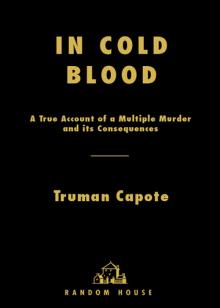 In Cold Blood
In Cold Blood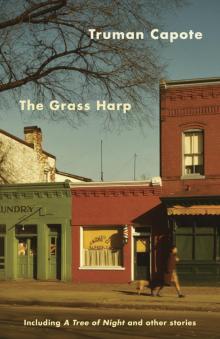 The Grass Harp, Including a Tree of Night and Other Stories
The Grass Harp, Including a Tree of Night and Other Stories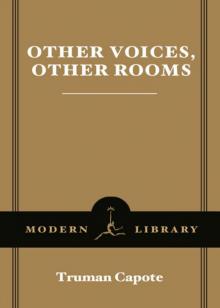 Other Voices, Other Rooms
Other Voices, Other Rooms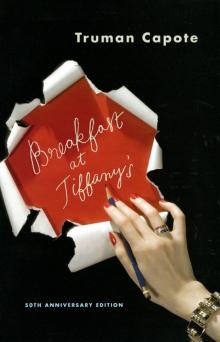 Breakfast at Tiffany's
Breakfast at Tiffany's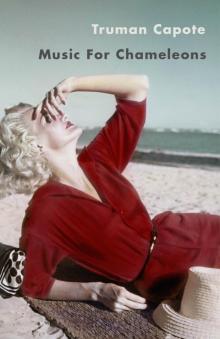 Music For Chameleons
Music For Chameleons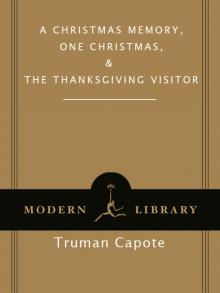 A Christmas Memory, Including One Christmas and the Thanksgiving Visitor
A Christmas Memory, Including One Christmas and the Thanksgiving Visitor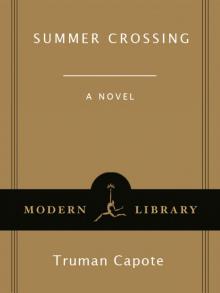 Summer Crossing
Summer Crossing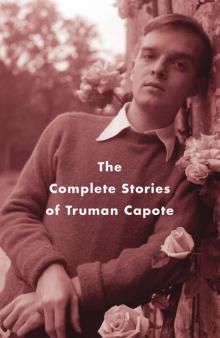 The Complete Stories of Truman Capote
The Complete Stories of Truman Capote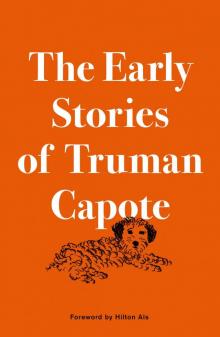 The Early Stories of Truman Capote
The Early Stories of Truman Capote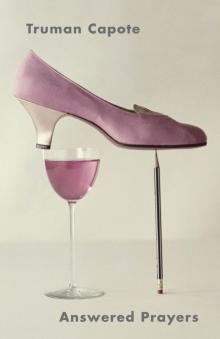 Answered Prayers
Answered Prayers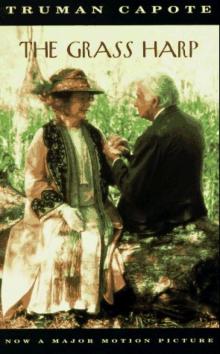 The Grass Harp
The Grass Harp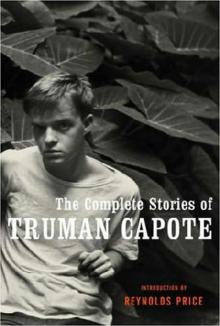 SSC (2004) The Complete Stories of Truman Capote
SSC (2004) The Complete Stories of Truman Capote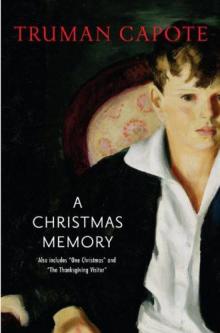 A Christmas Memory
A Christmas Memory